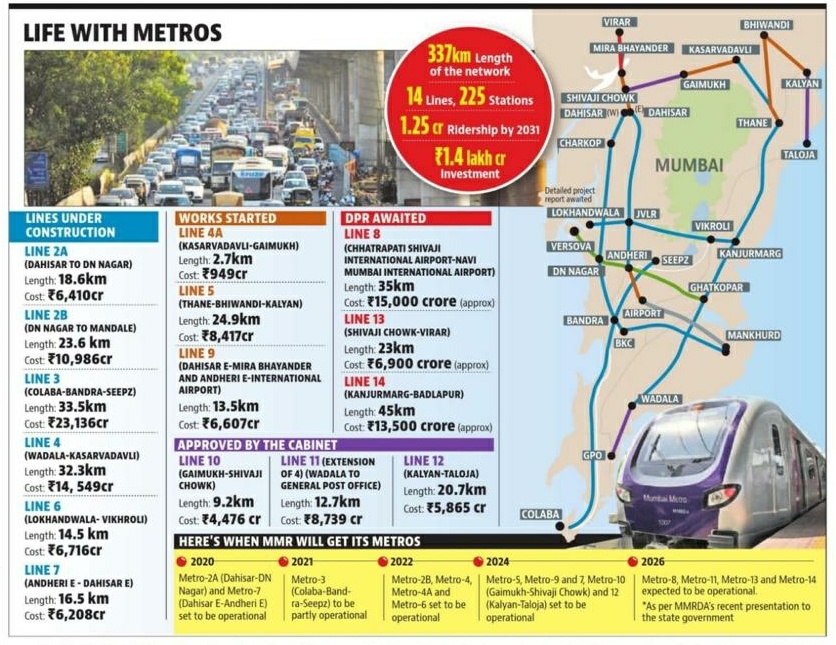Metropolitan Mumbai to boost average vehicle speed to 30kmph by 2026
Mumbai has become infamous for its road congestion
The study states, congestion around Mumbai’s urban agglomeration will also reduce to 9% by 2031 from 95% in 2017
By Tanushree Venkatraman
All 14 Metro lines, once operational by 2026, will boost the average speed of vehicles to 30kmph, from the current 17kmph, according to a study conducted by the Mumbai Metropolitan Region Development Authority (MMRDA). The Metro network will reduce the congestion on Mumbai’s roads to 33% from the current 137% by 2031, it states.
The congestion percentages are representative of the amount of extra time required to reach the destination. A 15% congestion would mean the travel time is 15% more than the average time required to reach the destination. The study, which looks at the whole of MMR, states congestion around Mumbai’s urban agglomeration will also reduce to 9% by 2031 from 95% in 2017. While urban planners agree that the travel time (congestion percentage) would reduce, they are unsure if the traffic congestion would come down.
Shankar Deshpande, joint project director (town planning), MMRDA, said, “We have defined traffic congestion as the difference between the ideal time needed to reach a destination and the required time. We undertook this study based on simulation modelling and we have found that it takes 41 minutes to cover a 14km distance in MMR, which should ideally be covered in 20 minutes. This will improve drastically by 2026, owing to the Metro lines when an average distance of 10km can be completed in 16 minutes.”
MMRDA, the planning body for the Mumbai Metropolitan Region, has prepared a master plan for the 14 lines, including the Versova-Andheri- Ghatkopar line-1, which will cover 337km and will be completed by 2026. It expects 1.25 crore people to use the Metro lines by 2031. It expects the number of road trips to reduce to 77 lakh per day by 2031, from 103 lakh trips per day, and a major chunk of suburban railway commuters to shift to Metro.
In the past few years, Mumbai has become infamous for its road congestion. The TomTom Traffic Index 2018 had stated that Mumbai is the most traffic- congested city in the world. The Dutch company, TomTom, had conducted a GPS-based study on traffic congestion around 400 cities of the world.
Owing to the Metro lines, MMRDA’s study estimates an increase in public transport share to 71% from 65% and private share to reduce to 28.7% from 32.6%. It has also estimated that building a Metro network will reduce CO2 emissions by 12.56 lakh tonnes per year, which is equivalent to planting 5.71 crore trees, Deshpande said.
Transport experts are sceptical. AV Shenoy, a Mumbai-based transport expert, said, “We must know the basis of this study. Often, government studies are done to suit an agenda. As of today, MMRDA is struggling to complete the projects owing to paucity of funds. If they have undertaken a study like this, it must be analysed by an independent expert or the results must be debated on a public platform.”
Amruta Ponkshe, associate fellow, Observer Research Foundation, said, “Such a drastic change will not be possible just by constructing Metros. We have already seen it in Delhi, where even a dense Metro network has not reduced traffic on roads. MMRDA has to consider measures such as congestion pricing, too, to discourage people from taking their cars out.”
Ponkshe said that cities largely look at congestion pricing, improving last-mile connectivity and the overall experience of using public transport to deal with traffic congestion. While MMRDA is not considering congestion pricing now, it has said that it could be a possibility in the future.

Dhawal Asher, senior manager, urban transport from the World Resources Institute, said, “As MMRDA is looking at Vision 2031, it must conduct these studies periodically to understand the transport needs. And if the study is looking at such a large shift from private to public transport, the authority must actively plan last-mile connectivity in the city.”
Courtesy: Hindustan Times


